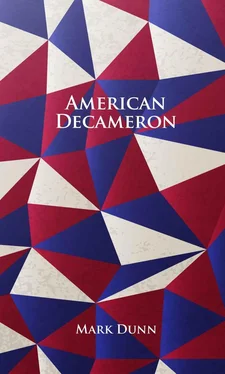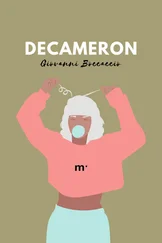Leonora nodded. “Is there a sister and is she really blind?”
“Yes. We’ll meet her later. Oh, and I really did have to register my new car. Funny how things work out sometimes.”
Leonora watched as the proudly naked James Touliatos turned and went back into the bedroom. Regardless of what happened between James and her from that point forward, she was enormously grateful to her friend Amanda for having brought the two of them together. And she didn’t know how she could ever thank her.
But she tried nevertheless. That next week she bought Amanda’s lunch. You know where.
1930 WITHOUT APRON STRINGS IN DELAWARE
The woman lived in an old ramshackle boardinghouse two blocks from the boardwalk in Bethany Beach. Her eyesight was failing and she had to squint up at the balding middle-aged man standing before her. She was sitting with another woman on a bench in front of the weather-beaten clapboard building. At first she doubted what the man had said when he introduced himself, but then she saw something in his eyes that reminded her of a man she’d known when she was young.
Jerome.
She had always believed Jerome to be the father of her second child, whom she had given up as an infant. The stranger’s eyes now confirmed it. The eyes spoke. They asked things of the woman. Jerome had been persistent in his bedroom advances. It was easy to see how his son would be persistent in his search for his mother.
“Would the two of you like some privacy?” asked Mrs. Grosbard. “I can make a pot of tea and take it up to your room.”
“I think I’d like to stay out here, if the young man doesn’t mind.” Sadie Craddock turned to the man she now knew to be her son. “This is my favorite time of year. The breeze is so cool and the ocean so kind.”
Mrs. Grosbard smiled at the man and got up. She turned and climbed the stoop and disappeared inside, the click of the screen door’s latch punctuating her departure.
A seagull landed on a grassy patch of sand nearby. It looked about for some stray morsel to eat. Sadie Craddock patted the wooden bench where she wanted her son to sit.
It was an old bench and seemed out of place in front of the boardinghouse. Harold wondered if it had once sat bolted to the boardwalk and then been replaced by something newer and shinier. He wondered if it had been brought here to end its days in the company of creatures equally old and only slightly more ambulatory.
Harold sat down. The sun, which had been bold, now retreated behind a rack of clouds. Harold took off his hat and brushed his brow with the sleeve of his shirt. His forehead was dry, but it was force of habit. Harold worked out of doors as a railway traffic inspector.
“How did you track me down?” she asked after he had settled in next to her.
“Aunt Emily said she’d heard that you’d moved to the Delaware coast a couple of years ago. She thought you’d become a Disciple of Christ. Isn’t this where ocean-loving Disciples of Christ wind up?”
It was hard for Harold to look at Sadie while sitting so close to her, but he wanted very much to do so. He had wondered for years what she would look like if he ever found her. Instead he looked at the sliver of seascape tightly framed by the two buildings across the street. The boardinghouse was near enough to the ocean that Harold could hear the cadence of its surf — near enough to smell its salty, fishy scent.
“How is Emily? It’s been years since I’ve seen your aunt.”
“She’s well. She lives in Plainfield, New Jersey. So you aren’t denying that I’m your son?”
Sadie took up Harold’s left hand and sandwiched it between her own hands, each age-spotted and osseous. “You have your father’s hands. Strong hands. He’s dead, isn’t he?”
Harold nodded. “When Aunt Emily told me who I was a few years ago, we talked a lot about you and about my dad — the way he’d come and go when I was young — checking in with me, I suppose, seeing what I was to become. And then he stopped coming. I was fifteen, sixteen by then. I knew what it meant. I knew that the drinking had finally done him in.”
“All the men I lay with drank. That’s one of the reasons I wouldn’t marry them.” Sadie released her son’s hand. He allowed it to lie limp and unattended upon the wooden slats of the weathered bench.
“How many children did you have?” he asked.
“Four. By four different men. Three girls and you. You went to the finest couple I knew: Jerome’s sister Emily and her husband Ennis. They couldn’t have children of their own. They treated you well, I imagine.”
“Very well,” said Harold. “You’re a Disciple of Christ now. Have you mended your ways?”
“I have. Most whores do when they reach a certain age. It’s either that or death by drink or injection.” Sadie swept her hand through the air to indicate the tiny sea town around her. “Not so terrible a place to pass the remaining years of one’s life. Quite churchy, but very quiet. Even in the summer. Not like Rehoboth and Ocean City. So, you see, I haven’t come to a tragic end. I’m relatively happy in my final chapter.”
Harold pulled back. He wanted to take in every crag and wrinkle upon his mother’s face, to see his own reflection in her eyes.
“Do you want to know anything about me ?” he asked.
Sadie shook her head. She watched the seagull take wing to seek scraps at some other doorstep. “Whatever good has happened to you in your life will only make me regret the fact that I wasn’t there to share it. Whatever bad will only make me feel guilty that I couldn’t offer support in your times of difficulty.”
“So you feel guilty? I mean, about having given me up?”
“Some days I feel terribly guilty. But the feeling doesn’t cloud my every hour. I was a selfish woman, Harold. I wouldn’t have made a very good mother. This was for the best. At the same time, I’m not the worst creature that God has ever placed upon this Earth. I’ve had my charitable moments. Some might say that my giving you and your sisters up was a charitable act in its own way.”
“I didn’t come here to judge you. Only to meet you.”
“And what will you take away from our visit, Harold?”
“This won’t be my only visit. I’d like to see more of you, with your permission.”
Sadie shook her head. “Let’s limit ourselves to this one time, shall we?”
“Why?”
“I brought you into this world. And then I sent you away. That was my choice. I reconciled myself to that choice many years ago.”
“And do I have no choice in this? It’s my choice that I should see you again. I choose as well to find my sisters and give them the chance to meet their mother while she’s still among the living.”
Sadie laughed. “A man of purpose. What do you do for a living, Harold? Are you a politician of some sort?”
Harold shook his head, his cheeks mantling over the precipitancy of his outburst.
There was music now, coming through the window of Mrs. Grosbard’s second-floor lodgings. It was a song that had been made popular by the Brox Sisters several years earlier. Mrs. Grosbard had put the record on her Victrola. Mrs. Grosbard could not possibly let this momentous encounter between long separated mother and son go without appropriate musical commentary.
The three songbirds from Tennessee sang in sweet harmony:
Tie me to your apron strings again .
I know there’s room for me .
Upon your knee .
Bring back all those happy hours when
You kissed my tears away…
“Mrs. Grosbard has slightly missed the mark,” said Sadie with gentle amusement. “That song. It’s about a child that leaves its mother but then comes back again. There’s a history there — a history that you and I don’t share.”
Читать дальше












